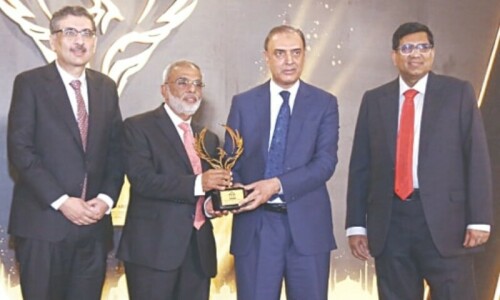RAWALPINDI, Jan 19: A variety of trends and assumptions will drive the development of this year’s World Economic Forum (WEF) opening at Davos (Switzerland) next week, official sources said on Saturday.
Opening on January 23, the five-day annual meeting of World Economic Forum under the principal theme of ‘The Power of Collaborative Innovation,” an interdisciplinary and systematic view of the major economic, political, societal and technological forces currently at work in the world, would form the conceptual pillars of the of the 2008 programme and the framework for the global agenda in Davos. Pakistan has been actively participating in the ‘World Economic Forum’ for the past several years, and this year, President Pervez Musharraf will lead the Pakistan delegation comprising high profile economic managers and private sector representatives.
A summary of report prepared for the 2008 Annual Meeting says the Forum’s programme will be based on five conceptual pillars, which are: Business (competing while collaborating); economics and finance (addressing economic insecurity); geopolitics (aligning interests across divides); science and technology (exploring nature’s new frontiers); and values and society (understanding future shifts).
In the area of competing while collaborating, the report says globalisation will continue to reward those companies that excel at collaborating internally and externally. Innovative products and services, and their speed to market, are increasing dependent on a firm’s ability to work in an interactive and integrated fashion, linking all its centres of excellence for a common purpose.
Industries are also discovering that much of their future growth depends on the ability to collaborate with different actors to build public-private partnerships, galvanise multiple stakeholders and work with fast-growing competitors. This collaboration requires trust and transparency and zero tolerance for corrupt practices.
While addressing economic insecurity, the report says the meltdown in the US subprime market, and the ensuing international credit drought, laid bare the reality that global financial markets are still navigating uncharted waters despite the proliferation of sophisticated algorithms and the securitisation of credit risks.
Lingering uncertainty in various markets reflects the need to rethink underlying risk management models.
Concern also remains over the growing global influence of private equity firms, hedge funds and sovereign wealth funds with respect to the governance of some of the world’s largest corporations, it says.
The report says shareholder activism is also much more pervasive; minority shareholders are increasingly driving key strategic and operational decisions typically made by a company’s management team. As uncertainty looms over the US economy, there is more confidence in China and India and other emerging markets assuming the driver’s seat for global growth — despite the fact that over 50 per cent of the global economy still rests in the hands of G-7 countries, the report states.
Discussing the concept of aligning interests across divides, the report says future generations are set to inherit a world replete with such global challenges as climate change, non-proliferation, terrorism, income inequality, natural resource scarcity, and spiralling healthcare and retirement costs.
Countries endowed with energy and natural resources — such as the Arab Gulf States, Iran, Nigeria, Mexico, Brazil, Russia and South Africa — are demanding a greater voice in global governance and international business.
Rebuilding efforts in Iraq and Afghanistan are facing growing uncertainty in terms of future international support, according to the report.
Exploring nature’s new frontiers, the report says science and technology are an inescapable presence in every facet of life. Almost every major policy issue on the global agenda has a scientific dimension; ageing societies, climate change, disease eradication and natural resource management are but a few of the most pressing examples.
The report says with advances in nanotechnologies, genetics and computer science in combination with other disciplines, the extent to which mankind can control and manipulate the natural world is reaching beyond the comprehension of the general public. At the same time, the mysteries of knowledge, memory, learning and emotion are unravelling with advances in brain and cognitive research.
For over three decades, the World Economic Forum Annual Meeting has provided an unrivalled platform for leaders from all walks of life to shape the global agenda at the start of each year. At the core is its multi-stakeholder model that leverages the collective wisdom of leaders from business, government, the media, academia, the arts and civil society by building a global platform for collaboration and action to address priorities on the global agenda.
Looking to the future, it becomes readily apparent that complexity, competing interests and scarce resources remain the greatest obstacles to progress on the global agenda in the absence of greater leadership and global stewardship.
The forum will also harness the wisdom and experience of diverse and international Co-Chairs: Tony Blair, former Prime Minister of the United Kingdom and Member of the Foundation Board of the World Economic Forum; James Dimon, Chairman and Chief Executive Officer, JPMorgan Chase and Co.; Henry A. Kissinger, Chairman, Kissinger Associates; Indra K. Nooyi, President and Chief Executive Officer, PepsiCo; and Wang Jianzhou, Chairman and Chief Executive, China Mobile Communications Corporation.















































Dear visitor, the comments section is undergoing an overhaul and will return soon.